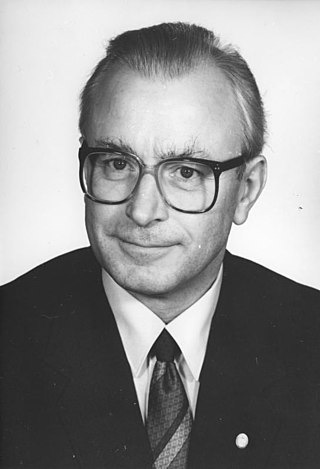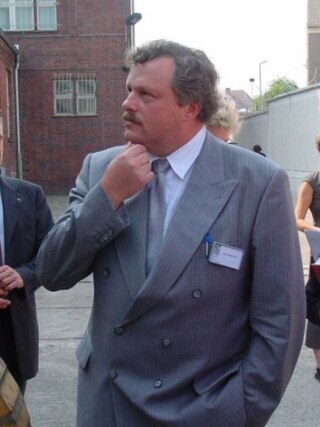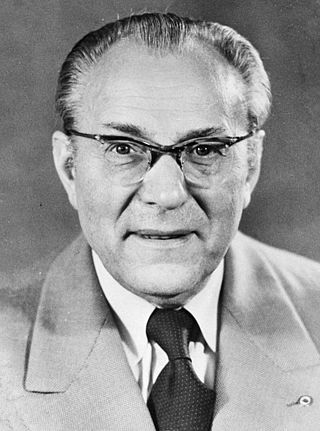Related Research Articles

Friedrich Wilhelm Reinhold Pieck was a German communist politician who served as the chairman of the Socialist Unity Party from 1946 to 1950 and as president of the German Democratic Republic from 1949 to 1960.

Wolfgang Schwanitz was a German intelligence official, who was the last head of the Stasi, the East German secret police. It was officially renamed the "Office for National Security" on 17 November 1989. Unlike his predecessor, Erich Mielke, he did not hold the title "Minister of State Security", but held the title of "Leader of the Office for National Security". Following the German reunification, he was active as an author of works that sought to portray the Stasi in a positive light.

Siegfried Reiprich is a German human rights activist and author. He was involved in the resistance against the communist regime of the German Democratic Republic (GDR), which led to him being expelled from university and eventually banished from the GDR. In 2009, he was appointed by the Government of Saxony as the Director of the Stiftung Sächsische Gedenkstätten. In 2011, he was elected as a member of the Executive Board of the Platform of European Memory and Conscience.

Ernst Melsheimer was a German lawyer.
Bernd Eisenfeld, also known by the pseudonym Fred Werner, was an opponent of the East German dictatorship who became a writer and an historian.
Manfred Döring is a former Major general (Generalmajor) with the East German Ministry for State Security (Stasi). He also served, between 1987 and 1990, as a commander of the elite motorised rifles regiment, the Felix Dzerzhinsky Guards.
Helmut Alfred Brandt was a Berlin city councillor and a leading German politician in the Christian Democratic Union , a political party of the centre right.
Marlies Deneke is a German politician.

Horst Pehnert was an East German journalist and party official who in 1976 became a long-standing deputy Minister for Culture - effectively the minister for film and cinema.
Günter Heyden was a German professor of philosophy and a sociologist. Between 1969 and 1989 he was the director of the East Berlin basedInstitute for Marxism–Leninism.
Bernhard Elsner was a Major general in the East German Ministry for State Security (Stasi). During the course of a long career with the quasi-military ministry, between 1972 and 1987 he was Commander of the Felix Dzerzhinsky Guards Regiment.
Christa Schmidt is a retired German politician (CDU). She served as a minister in the last government of East Germany. She had built an earlier career as a teacher and educationalist.

Stefan Wolle is a German historian. A focus of his socio-historical research is on the German Democratic Republic which is where, before reunification, he lived and worked.

Angelika Barbe is a German biologist who became a politician.

Stephan Krawczyk is a German writer and songwriter. Before 1989 he was a noted East German dissident.
Heinz Heinrich Schmidt was a German journalist and editor. During the twelve Nazi years he was involved in active resistance, spending approximately three years in prison and a further seven years as a political refugee in London.
Lothar Berthold was an East German Marxist-Leninist historian, university teacher and publisher. He was also an official of the country's ruling Socialist Unity Party . During the 1960s he was a member of the politburo's "Ideology Commission", widely regarded as one of the most committed and effective propagandists among East Germany's mainstream academic historians. His publications and political engagement after reunification reflected a continuing commitment to East German-style communism.

Hildigund Neubert is the daughter of an East German Pastor-Theologian who became a professional musician. As the pressures for change in the one-party dictatorship intensified, thanks both to the bankruptcy of the state and to the winds of Glasnost blowing across from, of all places, Moscow, she found herself drawn by circumstances into politics. At the time of East Germany's "peaceful revolution" she was in East Berlin, a permanent presence at the control centre of Demokratischer Aufbruch . A feature of those months was the dispersed character of the uprisings that destroyed the dictatorship: it is misleading to think in terms of any sort of central "guiding hand" controlling developments. Nevertheless, DA was one of a number of movements and organisations that became key to focusing the energies of hundreds of thousands of pro-democracy campaigners and demonstrators, in ways that led, in March 1990, to the only free and fair parliamentary election in the history of the "German Democratic Republic" and thereafter, more indirectly, to reunification in October 1990.

The First cabinet of Otto Grotewohl, also known as the Provisional Government of the GDR was formed by a law on the government of the GDR on October 7, 1949. According to the law, members of the government were: the prime minister, his 3 deputies and his 14 ministers. The number of ministers would increase to 15 after the State Security Department was elevated to a ministry by the Law on the Formation of a Ministry for State Security of February 8, 1950). It existed until November 7, 1950, after which the Council of Ministers became the government of the GDR as the Second cabinet of Otto Grotewohl.

At the inaugural meeting of the Volkskammer on 8 November 1950, Otto Grotewohl was elected Prime Minister. At the same time, the law on the government of the German Democratic Republic was approved and thus given a structure. Grotewohl presented his government at the 2nd meeting of the People's Chamber on 15 November 1950. Among them were 4 state secretaries with their own portfolio, whose secretariats were set up by resolution at the 1st government meeting, which took place before the 2nd Volkskammer conference. At the 2nd government meeting on November 16, 1950, the respective state secretaries of the ministries were appointed by resolution. Among the 21 ministers and almost 30 state secretaries were 13 candidates and members of the Central Committee of the SED, including 4 members of the Politburo. The block parties were represented by a total of 9 ministers and 8 state secretaries, with the CDU alone providing 4 ministers. The DBD was the only block party that did not provide a deputy prime minister at the beginning of the government period. The following overview lists the ministers and state secretaries of the GDR government at the beginning of the government period.
References
- 1 2 "Ehrhart Neubert geb. 2. August 1940 Herschdorf (Thüringen)". Die Chronik der Wende in 163 Folgen. Rundfunk Berlin-Brandenburg (rbb). Retrieved 24 January 2016.
- 1 2 3 4 5 6 7 8 Helmut Müller-Enbergs; et al. (2000). "Dr. Ehrhart Neubert, geboren am 02.08.1940, Religionssoziologe, Bürgerrechtler". "Wer war wer in der DDR?" - Fachbeirat Wissenschaft. Bundesstiftung zur Aufarbeitung der SED-Diktatur, Berlin. Archived from the original on 16 January 2016. Retrieved 24 January 2016.
- ↑ "Stasi Stolpes Verrat an der Kirche". Der Spiegel (online). 30 August 1993. Retrieved 24 January 2016.
- ↑ "Literatur von und über Ehrhart Neubert". Deutsche Nationalbibliothek, Frankfurt am Main. Retrieved 24 January 2016.
- 1 2 3 4 5 "Ehrhart Neubert". DDR 1989/90. Erhard Kleps, Berlin. Archived from the original on 30 January 2016. Retrieved 24 January 2016.
- 1 2 3 Matthias Geyer (4 November 2002). "Karrieren: Angela rennt". Der Spiegel (online). Retrieved 24 January 2016.
- ↑ Jan Wielgohs. "Neubert, Ehrhart * 2.8.1940 Religionssoziologe, Bürgerrechtler". Wer war wer in der DDR?. Ch. Links Verlag, Berlin & Bundesstiftung zur Aufarbeitung der SED-Diktatur, Berlin. Retrieved 24 January 2016.
- ↑ Christoph Dieckmann (25 October 1991). "Missionar der Stasi - Ein Ostberliner Pfarrer stellt sich seiner Gemeinde und seiner Vergangenheit". Die Zeit (online). Retrieved 24 January 2016.
- ↑ "Stolpes Stasi-Vergangenheit steht wieder auf dem Prüfstand" (PDF). CDU-Informationsdienst Union in Deutschland. Konrad-Adenauer-Stiftung e.V., Sankt Augustin. 23 March 1995. pp. 22–23. Retrieved 24 January 2015.
- ↑ Ehrhart Neubert (April 1998). Geschichte der Opposition in der DDR 1949-1989 (Forschungen zur DDR-Gesellschaft). Ch. Links Verlag, Berlin (paperback edition). ISBN 978-3-861-53163-0.
- ↑ Hans Michael Kloth (12 January 1998). "Politisches Buch Tausend Seiten Widerstand". Der Spiegel (online).
- ↑ Stéphane Courtois; Joachim Gauck; Ehrhart Neubert; et al. (1998). Das Schwarzbuch des Kommunismus. Unterdrückung, Verbrechen und Terror. Piper Verlag, München. ISBN 3-492-04053-5.
- ↑ "Wir über uns: Das Bürgerbüro wurde am 17. Juni 1996 gegründet ..." Bürgerbüro e.V., Berlin. Retrieved 25 January 2016.
- ↑ "Erhart Neubert (Pfarrer, 74 Jahre )". This source includes a telling picture of Ehrhart and Hildigund Neubert with a homemade "Demo-banner". Akademie für Ost-West-Begegnungen e.V., Berlin. 2014. Retrieved 25 January 2016.
- ↑ Hildigund Neubert (2010). "Haftzwangsarbeit im SED-Staat: Keine Verantwortung für zweifelhafte Geschäfte". Horch und Gluck (Zeitschrift. Bürgerkomitee Leipzig e.V. pp. 26–29. Archived from the original on 2016-01-30. Retrieved 2016-01-25.